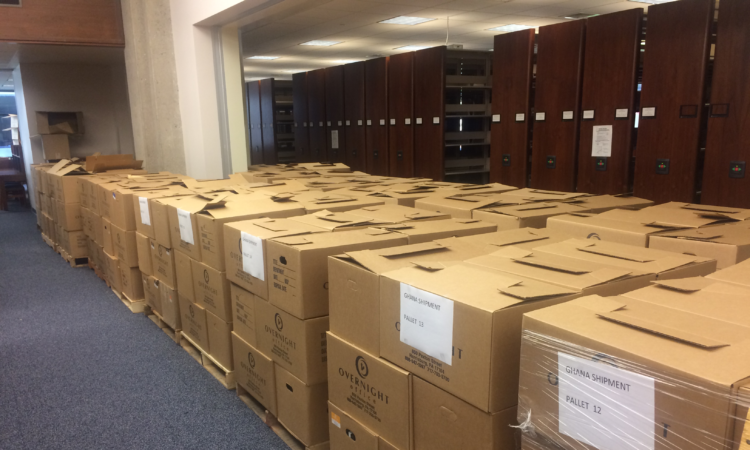
Editor’s note: This story is one in an occasional series highlighting a relationship between Penn State College of Medicine and Mountcrest University College in Ghana.
Medical students in the United States don’t generally have to worry about things like unreliable electricity and Internet service. This is not the case in rural Ghana, where Mountcrest University College (MCU) is preparing to open the first private medical school in the country. Without reliable service, students are more dependent on printed materials than the digital resources available to their American counterparts.
Two 40-foot containers of donated materials were shipped to Ghana.
As part of an ongoing partnership, Penn State College of Medicine library staff recently loaded two, 40-foot containers with donated materials bound for Mountcrest. This was the second donation from the College of Medicine since the inception of Mountcrest’s medical school last year.
The College of Medicine is in the process of renovating the George T. Harrell Health Sciences Library, requiring staff to cull large amounts of printed materials from its collection.
“This was a really opportune moment in time where we had this massive amount of materials that we were going to be removing because Penn State University Libraries has electronic access to the materials and the real estate is more valuable than functioning as a book archive,” said Cynthia Robinson, director, George T. Harrell Health Sciences Library.
This allowed Mountcrest to receive a significant amount of materials for only the cost of shipping.
The donations will help Mountcrest establish a medical library that meets Ghana’s National Accreditation Board’s standards.
“We were happy to offer the collections to them,” Robinson said. “In the end, we’ll send about 11,000 journal volumes and 5,300 monographs to Mountcrest for the foundation of its library.” A monograph is a scholarly piece written on a specific subject and is essay to book length.
In a shipment last year, Mountcrest received about 3,000 books and 3,200 journals.
“Obtaining relevant medically related print materials has been very difficult for them because unlike here in the United States, the books are not readily accessible,” said Dr. Ben Fredrick, director of Penn State Hershey Global Health Center. “The cost of the materials is also quite considerable.”
With the two containers shipped in the second round of donations, the school will receive an additional corpus of much-needed medical journals and books. Part of both shipments included books that faculty and students donated.
“We’ve been fairly selective, sending things that are reasonably recent and relevant in clinical medicine,” Robinson said. “For developing countries to establish a library and have access to the appropriate materials free or inexpensively is a great thing.”
The donations are appreciated by the school’s leadership.
Penn State College of Medicine’s Tina Engle with Susana Wumbee, a Mountcrest faculty member visiting the College of Medicine’s Simulation Center for a six-month fellowship with a portion of the boxes full of donated medical education resources donated to Mountcrest College University.
“While the college is aiming at entering the age of Internet, as the future lies in this direction, our circumstance in this part of the world obliges us to continue to provide materials in printed form as well,” said Dr. Samuel Akortey Akor, dean of the Mountcrest Medical School.
Additionally, Mountcrest still faces the challenge of acquiring and maintaining electronic and digital resources which are costly and require consistent electrical supply as well as high-speed Internet access to take advantage of the resources available. Mountcrest’s library does have access to online bibliographic databases that are standard in places like the U.S., such as PubMed, Lexis Nexis and African Index Medicus.
“They will need to purchase a number of computers for the digital side of the library since they anticipate that a number of students will not have their own computers,” Fredrick said. “Meeting the needs of the students in this regard is a priority for them, but so also for the faculty who are trying to find ways to stay current with their teaching materials.”
Additional free or low-cost electronic resources made available to developing countries are being identified and organizations that could assist Mountcrest with this obstacle are being sought out.
According to Akortey Akor, securing their place in the digital age will also allow Mountcrest to automate library procedures like the library catalogue, lending activities and report generation.
While printed materials to donate will become less plentiful, Robinson expects to have an ongoing dialog with and provide advice and support to Mountcrest’s new librarian. Fredrick expects to find additional ways to help, as well.
“While our library services finished boxing up its print resources for donation, our relationship with Mountcrest continues to reveal opportunities for donations,” he said. “On my recent trip in September, for example, we talked about the need for lab equipment for their school and textbooks for their students.”
If you’re having trouble accessing this content, or would like it in another format, please email the Penn State College of Medicine web department.
Check your inbox or spam folder now to confirm your subscription.
© 2024 Penn State College of Medicine
Have questions, or suggestions for missing content? Email us at comweb@pennstatehealth.psu.edu







